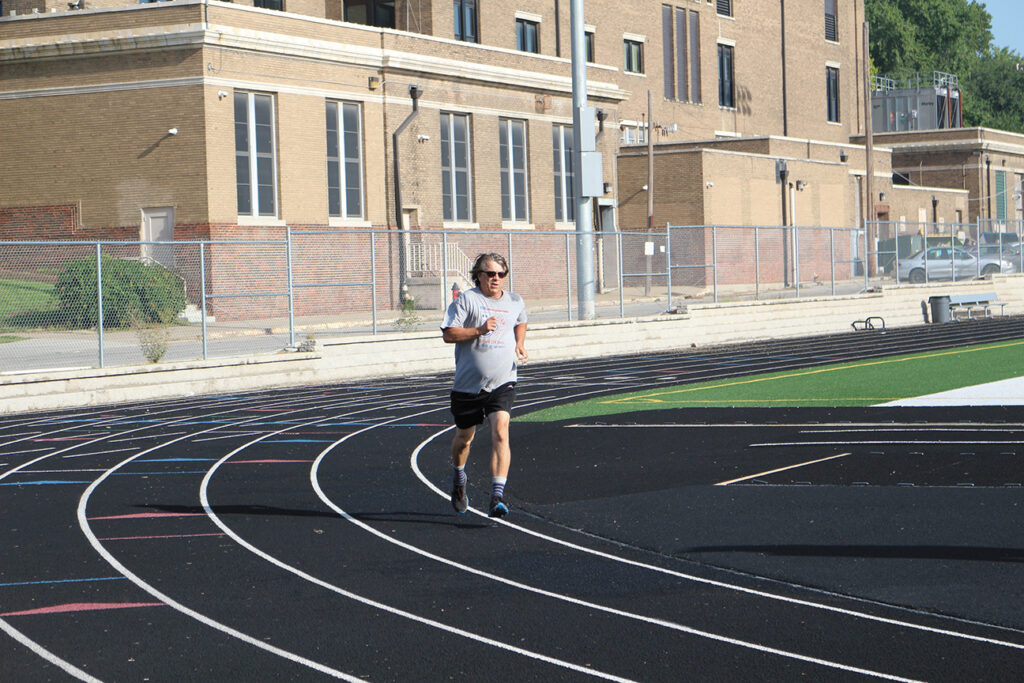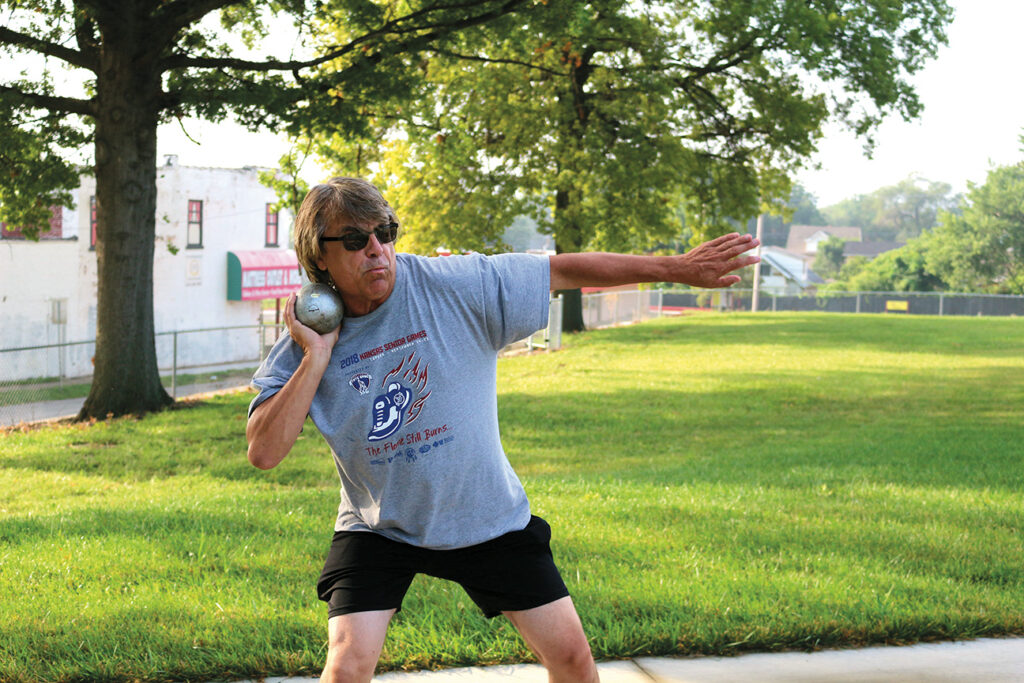
Abby Hoover
Managing Editor
Even with the uncertainty surrounding whether sports can be played safely, from Little League to the NBA, midwest senior citizens continue to train for their annual showdown.
Ray Kopek, a resident of Historic Northeast Kansas City for 60 years, will participate in the Kansas Senior Games, a multisport competition for athletes ages 50 and older.
The games take place over two weekends in September, this year the 11th through 13th and 18th through 20th, in Topeka, Kan. The 17-sport Olympic-style competition is designed to encourage active and healthy lifestyles for every age. Kopek will compete in the 60 to 64 age group.
In weekend one, he will compete in the shot put, 5,000-meter racewalk, discus, 1,500-meter racewalk, and 200-meter run.

During weekend two, he will golf 18 holes at Lake Shawnee, play horseshoes, compete in table tennis and participate in singles bowling. On Sunday, the games will conclude with a 5K run at Forbes Field, a former Air Force base.
The 2017 Kansas Senior Games champion, Kopek trains by running the stairs at Concourse Park. This year alone, he has traversed the stairs 877 times. Last year, he reached a new personal record of 3,041 times.
From the bottom to the landing at the base on the backside of the Colonnade in Concourse Park, there are 99 steps, and another 45 to street level. Kopek runs the stairs four or five times nearly every day, and sometimes twice a day.
“Usually I do these in the morning because it’s quiet, not a lot of people out,” Kopek said. “Then if I go in the evening, I go over [to the other side of Kessler Park] because there’s nobody around, for safety, you know, because people hang out and party over here sometimes.”
Potentially using them more than anyone else, Kopek said he has climbed the stairs over 7,000 times since they were built in the fall of 2015. He has also swept, shoveled snow, planted flowers and cut up fallen trees around the steps over the years. Year round, he prefers running outside to a treadmill.
Now in his 48th year of running, he estimates he has taken more than 1.5 million steps since 1972, and has run, walked and biked over 125,000 miles, including running the Cliffhanger 5K 26 times.
“The cliffs are a great place, you see lots of walkers and joggers down there,” Kopek said, adding that he likes a challenge, and invites anyone he meets to run with him on the stairs, but they often give up quickly.
Kopek coached long jump and triple jump at Van Horn High School in 2017, and substitute teaches between taking classes to further his own education.
Occasionally, Kopek practices with former Northeast teacher Bill Kanan. While practicing on the brand new track at Northeast High School, Kopek reminisces often about his time there.
“I remember after school we’d always meet out in the back, we’d wait forever for our coach, then he’d just talk forever,” Kopek said. “He’d tell us we’re going to go run down to Gladstone, to Indian Mound, then back this way, all the way through the cliffs down there, come back, then we’re going to go on the track and do like a mile’s worth of straightaways. We’ll do quick down the straightaways, jog the curve, and 10 times like that would be our workout.”
Kopek found a love for running at age 12 when he attended a high altitude running camp in Colorado with his team, where he watched the Pikes Peak Marathon. He met a five-time champion who, to this day, he still calls a mentor and friend.
“I was the littlest kid there, and the youngest, and so instead of being jealous of them I wanted to hang around them because I wanted to learn how they did it,” Kopek said.
When he was 13, he competed in the race, and although he was almost last, he finished, and from there he improved each year. When Kopek was 17, he ran to the top and back to the starting line in five hours and 28 minutes, about the time it took him to run to the top the first time.
The Pikes Peak Marathon inspired his book, “The Kid and His Mountain,” which Kopek hopes will soon be an animated movie.
“I wrote an adventure story about how I had to struggle to cut grass, do little jobs as a pint-sized kid, to try to run in the hardest race in the world,” Kopek said.
The lessons he learned helped him prepare for adulthood. Now, when approaching the Games, Kopek likes to participate in a variety of events, and doesn’t focus his practice time on one in particular.
“I’m doing a lot of events, I’m going for quantity,” Kopek said. “But probably some of [the participants], if they’re between 60 to 64, if they’re retired, and they’re going to just do track, they’re probably running pretty good. If I can get some seconds I’ll be good, and if I get a first I’ll be happy.”
While Kopek favors running, he has picked up other events over the years. This year the Games have eliminated ping-pong, pole vault, swimming and high jump because of COVID-19.
“I get on my bike, I feel pretty good,” Kopek said. “You know, you’re cruising along and you’re pushing. I like racewalking, you really want to go and you’re walking kind of fast, but you’re not really – if you’re running you get going – but you still feel like you’re fighting yourself.”
Racewalking requires one foot to be on the ground at a time, which differentiates it from running. Kopek has been working on his technique – he finds out who is in his age group and focuses on beating them, but he’s determined not to work any harder than he has to so he can keep his energy for later events.
Kopek said staying active is important for health, and is especially good for one’s heart.
“It’s a good positive habit for relieving stress,” Kopek said. “You know, people relieve stress in different ways, so that’s the way I do it.”
















